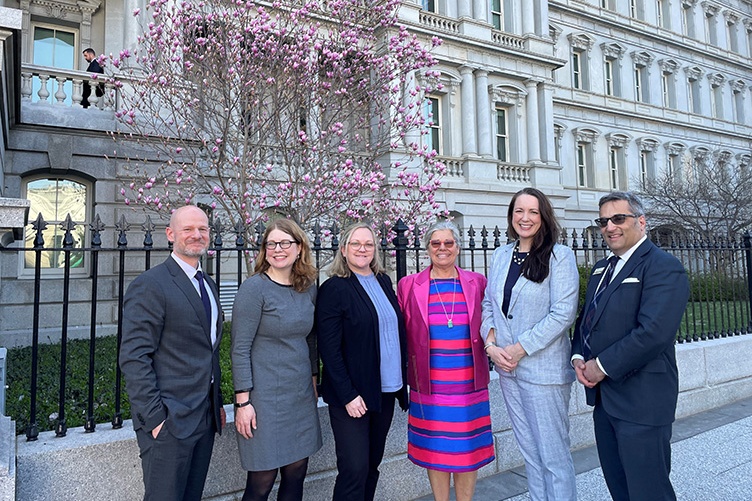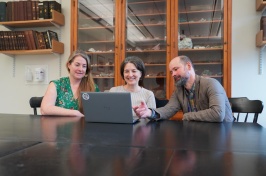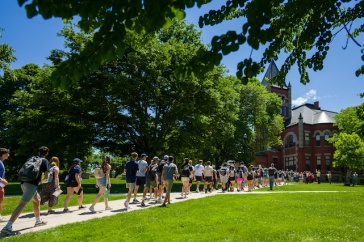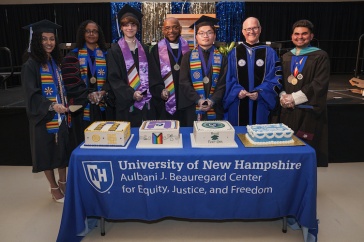
Kelly Nye-Lengerman (second from right), director of the University of New Hampshire Institute on Disability, stands with fellow directors of University Centers of Excellence on Developmental Disabilities (UCEDDs) and Protection & Advocacy agencies in Maine, Vermont and New Hampshire outside the Eisenhower Executive Office Building in Washington, D.C.
UNH’s Institute on Disability (IOD) was represented at the White House last week, as Kelly Nye-Lengerman, director of the IOD, spoke at the Communities in Action: Building a Better Maine, New Hampshire, and Vermont event.
The event is part of a series featuring local elected officials and community leaders “working on behalf of their communities to create opportunities and improve people’s everyday lives.” The series features visits from leaders who have received and put to use federal funding.
Nye-Lengerman’s comments at the event centered around three central themes the IOD has tackled: Addressing the human services workforce crisis by creating pathways for certification and advancement for direct support professionals (DSP) and behavioral health care workers, improving the children’s behavioral health system of care, and advancing evidence-informed practices that support improved mental health interventions for people with intellectual and development disabilities (IDD).
“Participating in this event was such a unique and compelling experience,” Nye-Lengerman says. “As a member of the UNH community, I was proud to share examples of how our state’s flagship university is leveraging federal funds to embrace New Hampshire and expand research and academic excellence. The Communities in Action event showcased how through collaboration and partnership we can improve the lives of citizens of New Hampshire and New England.”
Nye-Lengerman was joined at the event by leaders from Vermont and Maine. She had an opportunity to address the audience as part of the day’s agenda, highlighting the impact of the work the IOD is doing.

Inadequate funding, low wages, and lack of recognition for direct support work as a profession are just some of the factors that have contributed to New Hampshire’s care workforce crisis. The IOD continues to do its part to build capacity by developing training models like Building Futures Together and DSP Academy that open doors to certification and advancement for DSP and behavioral healthcare workers. The DSP Academy launched a pilot program to reduce turnover among DSPs, creating a pathway for advancement. Providing competency based, interdisciplinary training is a core function of the IOD, Nye-Lengerman says.
Nye-Lengerman also addressed improving the children’s behavioral health system of care, as a means of trying to improve what can be a frustrating journey to finding the appropriate behavioral health care options.
The DHHS Bureaus of Children’s Behavioral Health employed IOD professionals to develop and stand up a NH Children’s Behavioral Health Resource Center (CBHRC). The New Hampshire government website for CBHRC helps connect those in need with the appropriate providers, based on specific diagnosis, age, type of intervention or symptoms, building a road to more targeted and personalized care. The resource center has connected children and their families with more than 106 behavioral health providers through the searchable state-wide database. Building capacity and access to high quality behavioral health services for children and youth has been a long-time focus area of the IOD, Nye-Lengerman says.
The IOD is also helping to improve the delivery of support systems to people with intellectual and developmental disabilities and a mental health condition (IDD-MH). Through the IOD’s National Center for START Services, the IOD provides prevention and intervention training to states, counties and local providers to increase their capacity to respond to the needs of people with IDD-MH. Annually more than 4,000 individuals with IDD-MH access START teams across the United States. In 2022, 71% of people served by START teams saw a reduction in mental health symptoms. Nye-Lengerman identified the needs of people with IDD-MH as an important priority for policy makers.
-
Compiled By:
Keith Testa | UNH Marketing | keith.testa@unh.edu





















































